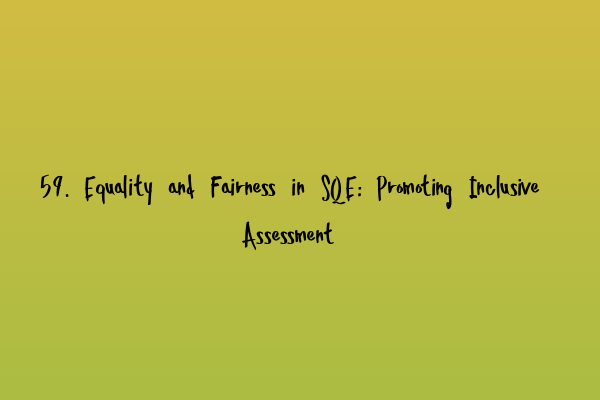59. Equality and Fairness in SQE: Promoting Inclusive Assessment
Welcome to the SQE Exam Law blog, where we discuss important topics related to legal education and the Solicitors Qualifying Examination (SQE). In this blog post, we will explore the significance of equality and fairness in the SQE, and how it promotes inclusive assessment for aspiring solicitors.
At SQE Exam Law, we firmly believe that every student should have an equal opportunity to succeed in their legal career. This means that the assessment process should be fair and unbiased, allowing candidates to showcase their knowledge and skills without any discrimination.
To ensure equality and fairness, the SQE has implemented various measures, including the use of multiple-choice questions (MCQs) and case studies to assess candidates’ legal knowledge in real-life scenarios. These assessment methods not only test the candidates’ understanding of legal principles but also their ability to apply them effectively. For further information on applying knowledge in real-life scenarios, you can refer to our related article on SQE Case Studies: Applying Knowledge in Real-Life Scenarios.
The SQE is a comprehensive exam that covers a wide range of legal topics. To master time management and efficiently complete the exam, candidates must devise effective strategies. We have a detailed article on Mastering Time Management in SQE: Strategies for Efficient Exam Completion, which provides valuable insights for optimizing your study and exam preparation.
Analyzing mock results is an essential part of the SQE preparation process. By identifying areas of improvement, you can tailor your revision and focus on strengthening your weak points. Our related article on Analyzing Mock Results for SQE: Identifying Areas of Improvement gives you a step-by-step guide to effectively analyze your mock exam results.
One of the challenging aspects of the SQE exam is the MCQ section. However, with the right approach and preparation, you can conquer these questions and maximize your score. Our article on Conquer the Multiple Choice Questions (MCQ) in SQE1 provides valuable tips and strategies to excel in this section.
To achieve success in the SQE, mastering effective revision techniques is crucial. Our related article on Mastering Effective Revision Techniques for SQE Success offers an in-depth exploration of various revision strategies and study techniques that can help you perform at your best.
Now, let’s dive deeper into how the SQE ensures equality and fairness in its assessment process. To begin with, the exam is designed to be objective, meaning that all candidates are assessed using the same criteria and performance standards. This eliminates any potential bias or favoritism, ensuring a level playing field for all aspiring solicitors.
Furthermore, the SQE aims to assess candidates’ problem-solving abilities rather than relying solely on memorization. By focusing on practical legal scenarios and case studies, the exam allows candidates to demonstrate their analytical skills and their capacity to handle real-world situations. This approach ensures that candidates are evaluated based on their ability to apply legal principles in a practical context, rather than their ability to simply regurgitate information.
In addition to the content of the exam, the SQE also ensures fairness by offering reasonable accommodations to candidates with disabilities or specific needs. This promotes inclusivity and allows every individual to perform to the best of their abilities, regardless of their physical or cognitive limitations.
It is important to note that the SQE’s commitment to equality and fairness extends beyond the assessment process. The exam aims to attract candidates from diverse backgrounds, fostering a legal profession that reflects the society it serves. By ensuring equal opportunities for all, the SQE promotes a more inclusive and representative legal profession.
In conclusion, the SQE places a strong emphasis on equality and fairness in its assessment process. Through objective and practical assessments, it enables candidates to showcase their legal knowledge and skills without bias or discrimination. By implementing measures to accommodate specific needs and promoting diversity, the SQE creates a more inclusive environment for aspiring solicitors.
We hope you found this blog post informative and insightful. If you are interested in learning more about other important topics related to the SQE, we encourage you to read our related articles linked below:
– SQE Case Studies: Applying Knowledge in Real-Life Scenarios
– Mastering Time Management in SQE: Strategies for Efficient Exam Completion
– Analyzing Mock Results for SQE: Identifying Areas of Improvement
– Conquer the Multiple Choice Questions (MCQ) in SQE1
– Mastering Effective Revision Techniques for SQE Success
Thank you for reading, and we wish you the best of luck in your SQE journey!
